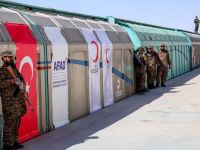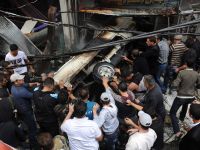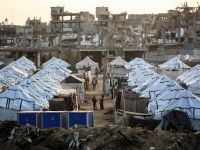Almost half of war-ravaged Sudan will not vote in this month's general elections because they live in areas where the government has no presence, according to the main southern rebel group.
"The opposition controls 45 to 50 percent of the country, including south Sudan, which is about a third of the country. We are not part of that election," said Samson Kwaje, spokesman for the Sudan People's Liberation Army (SPLA), which has been fighting Khartoum since 1983.
Khartoum does, however, control some important towns in the south, including its traditional capital, Juba, the railhead town of Wao, as well as Awel, Torit, Kapoeta and Bentui, the site of important oil fields.
Presidential and legislative elections are scheduled to be held from December 11-20.
"These elections will not succeed because they will be partial. Almost half the population will not take part," said Kwaje.
He added that the SPLA had invited election observers to verify that no voting took place in areas under its control so as to pre-empt any attempt by Sudanese President Omar al-Bashir to claim victory there.
"It is not the right time for elections. That will come when the war stops, when there is a political solution and after an interim period," said the spokesman.
"Whoever is elected president will not be legitimate, the legislature will not be representative of the whole country."
"We are fighting for a just Sudan, for a non-religious-based constitution, where citizens are all equal, where development is equal, where people of south Sudan have the right to self-determination, to have a referendum to decide whether to remain one country or to to break away," explained Kwaje.
"The natural resources situation, particularly oil, has complicated the conflict. We even think the war is being fought over resources. The government of Sudan is using the profits from the oil to prosecute the war," he added.
The combination of protracted conflict and recurrent drought has left Sudan in dire straits, compounded in the south in recent months by frequents air raids by Khartoum's Antonovs.
"The people of Sudan are living in almost continuous emergency," according to UNICEF.
Most of the country, especially the south, depends on international assistance and has become the permanent workplace of at least 50 aid agencies.
Earlier this month, the UN appealed for almost 200 million dollars to carry out its work there in 2001.
According to the UN, there are four million people internally displaced in southern Sudan as a result of the war. That is 13 percent of the country's population.
Phrases such as "widespread human rights abuses," "chronic structural underdevelopment," "decline in agricultural production," and "virtual collapse of the road network" pepper the text of the UN appeal.
The document points out that "the war in Sudan consists of both a north-south conflict and more than 40 deep-rooted and protracted conflicts among various ethnic groups ... fought over natural resources like water, land, fish and cattle as well as local political and administrative power."
"It is estimated that resource-based conflicts are inflicting higher human and material losses, year after year, than the main north-south conflict," it added.
The humanitarian consequences of the insecurity and drought include the fact that just 30 percent of south Sudan's population, in some areas as little as five percent, have access to clean water.
"Most of the country will face food security problems over the next year," according to the appeal.
"Chronic malaria, acute respiratory illness and diarrhea diseases characterize the health situation in Sudan... Many villages have received no drugs or health training in months if not years," it noted.
The war has also crippled the education system. According to UN figures, only about 30 percent of south Sudan's one million primary school age children are actually enrolled in school – NAIROBI (AFP)
© 2000 Al Bawaba (www.albawaba.com)







